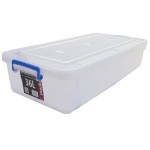Essential Aspects of Large Capacity Storage Devices in Computers
In the digital age, data has become a vital asset, and the need for reliable and spacious storage solutions has grown exponentially. Large capacity storage devices play a crucial role in meeting this demand, enabling users to store vast amounts of data, from personal files and multimedia to complex business applications.
### Types of Large Capacity Storage DevicesThere are several types of large capacity storage devices available, each with its own strengths and weaknesses:
- Hard Disk Drives (HDDs): Traditional mechanical storage devices that use spinning disks to store data. They offer large capacities at affordable prices but are slower and more prone to failure than other options.
- Solid State Drives (SSDs): Use flash memory to store data, resulting in faster performance, lower power consumption, and greater durability compared to HDDs.
- Hybrid Hard Drives (SSHDs): Combine HDDs and SSDs to provide a balance of speed and capacity at a lower cost than pure SSDs.
- Network-Attached Storage (NAS): Dedicated storage devices connected to a network, allowing multiple users to access and share data from a central location.
- Cloud Storage: Online storage services that provide access to data from anywhere with an internet connection.
When choosing a large capacity storage device, it's essential to consider the amount of data you need to store and the performance requirements of your applications. HDDs offer the highest capacities, typically ranging from 1TB to 16TB, while SSDs provide faster speeds and capacities up to 8TB. NAS devices can support multiple drives, allowing for even larger capacities.
### Reliability and Data ProtectionReliability is crucial for ensuring the integrity of your data. HDDs have a higher failure rate than SSDs due to their mechanical components, but RAID technology can be used to enhance reliability. SSDs and NAS devices offer higher levels of data protection through built-in redundancy and backup features.
### Connectivity and CompatibilityConsider the connectivity options available on your storage device. HDDs and SSDs typically connect via SATA or NVMe interfaces, while NAS devices provide network connectivity options such as Ethernet or Wi-Fi. Ensure that the chosen device is compatible with your computer and operating system.
### Other Features to ConsiderAdditional features may further enhance the functionality of your storage device:
- Encryption: Protects data from unauthorized access.
- Data deduplication: Reduces storage requirements by eliminating redundant data.
- Remote access: Allows you to access your data from anywhere.
- Power management: Conserves energy and extends the lifespan of the device.
Large capacity storage devices are essential for managing and preserving vast amounts of digital information. By understanding the different types, considering capacity and performance, ensuring reliability, exploring connectivity options, and evaluating additional features, you can select the ideal storage solution for your specific needs. From storing personal files to powering business applications, a reliable and spacious storage device will empower you to harness the full potential of your data.

Computer Storage Devices

Storage Devices Computer Science Gcse Guru

Smallest To Largest Storage Capacity

High Capacity External Hard Disk Top 6 Best Disks For Your Data Storage Requirements The Economic Times

Explainingcomputers Com Storage

Computer Storage Devices

Computer Storage Devices Types And Uses Dataflair

Data Storage Devices Learn Definition Examples And Uses

The Top 10 Storage Devices On Market 2024

Computer Parts Storage
Related Posts








